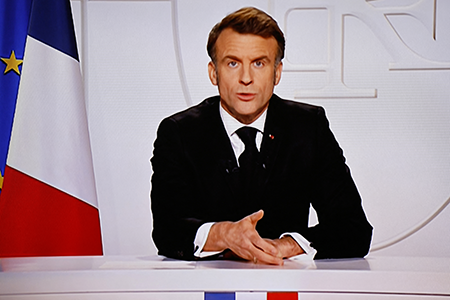"I greatly appreciate your very swift response, and your organization's work in general. It's a terrific source of authoritative information."
Leaders Discuss European Extended Deterrence
April 2025
By Xiaodon Liang
Leaders in France, Germany, and Poland have signaled plans to fundamentally reconsider their countries’ nuclear policies as Europe adjusts to the possibility of weaker U.S. commitments to the continent under a second Donald Trump presidency.
In a March 5 televised address, French President Emmanuel Macron said he would open a strategic debate with European allies on the role of French nuclear forces in their protection. Macron made a similar offer to discuss France’s notably opaque nuclear policies to allies in February

2020, when he declared that “France’s vital interests now have a European dimension.” (See ACT, March 2020.)
The suggestion of a greater role for French nuclear forces in defending against a perceived Russian threat comes at the invitation of German Chancellor-elect Friedrich Merz, who, speaking Feb. 21 to German television station ZDF, said Germany should discuss how French and UK nuclear forces could help guarantee European security.
Merz also called for a new European nuclear sharing arrangement, but clarified in a March 9 radio interview that he would prefer to see existing NATO nuclear sharing plans, which call for NATO aircraft to deliver U.S. gravity bombs stationed in Germany and four other NATO countries, maintained as well.
Nuclear sharing was not mentioned in Macron’s March 5 speech. The president made clear instead that nuclear decisions would remain in his hands.
In a March 6 radio interview, French Defense Minister Sébastien Lecornu affirmed that sharing French nuclear forces was not part of Macron’s offer.
Merz also emphasized that Germany would not seek nuclear weapons itself due to its treaty obligations.
The incoming chancellor has made German rearmament a priority. On March 18, the Bundestag, in a lame-duck session, approved a package of amendments to Germany’s Basic Law that would permit a significant increase in military spending.
Polish Prime Minister Donald Tusk also signaled his intention to engage Macron on the offer of a French nuclear umbrella in a March 7 speech to the Polish parliament. Tusk suggested that Poland should “reach for opportunities related to nuclear weapons,” according to The New York Times, although he paused short of calling for a national nuclear weapons program.
Polish President Andrzej Duda, a political rival of Tusk, renewed March 13 his call for the United States to deploy nuclear weapons in Poland as part of NATO’s nuclear sharing arrangements. Duda, who faces reelection in May, made a similar pitch to the Biden administration in 2022. (See ACT, November 2022.)
U.S. Vice President J.D. Vance was quick to dismiss the prospect, saying in a Fox News interview on the same day that he would be “shocked” if President Donald Trump would support the idea.
Macron’s extended deterrence proposal has been met with a mixture of concern and scorn in Russia. Kremlin spokesman Dmitry Peskov accused the French president of “thinking more about war, about continuing the [Ukraine] war,” in March 6 comments to reporters.
But Russian Foreign Minister Sergey Lavrov made light of the French offer in a March 12 interview, describing it as a pledge to “protect all of you with my three or four nuclear bombs.”
The United Kingdom did not respond in public to Merz’s call for new dialogue on European extended deterrence. Unlike France, the UK already maintains that its nuclear forces are assigned to defend the NATO alliance.
The UK government believes that U.S. technical support for UK nuclear forces continues to be reliable, according to a comment by the prime minister’s office to The Guardian. The statement came after a former UK ambassador to the United States, David Manning, questioned the longstanding nuclear relationship in March 5 testimony before a House of Lords committee.
The renewed push across Europe for increased military spending comes after signals that U.S. commitments to NATO’s defense might be weakening. A confrontational Feb. 13 speech by Vance at the Munich Security Conference inflamed concerns initially prompted by the U.S. administration’s direct outreach to Russia on the war in Ukraine.
“Listening to that speech, they try to pick a fight with us and we don’t want to pick a fight with our friends,” said Kaja Kallas, the European Union’s high representative for foreign affairs, on Feb. 14, Reuters reported.
Trump further exacerbated European worries March 6 when he said that the United States might adopt a policy of not defending NATO allies that fail to meet military spending targets. “If they don’t pay, I’m not going to defend them,” he said, according to the Associated Press. The comment came after NBC News first reported on the potential policy shift, citing multiple administration sources.
Leaders of the 27 EU member states endorsed on the same day a proposal by the European Commission to ease the bloc’s budgetary spending rules to permit additional military spending. Commission President Ursula von der Leyen claimed that this would allow for about $700 billion in additional military investment, which could be supplemented by another $160 billion in EU-backed loans.
